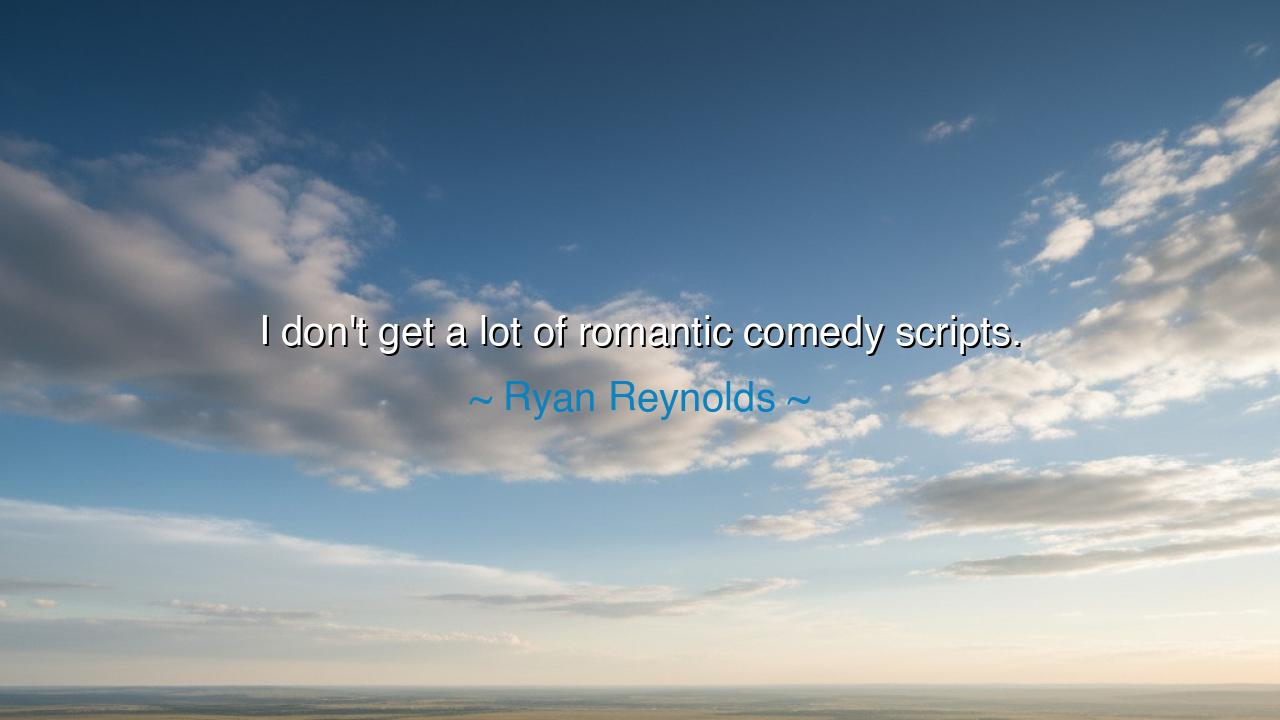
I don't get a lot of romantic comedy scripts.






Gather, O children of wisdom, and listen to the words of Ryan Reynolds, whose reflection on his career holds within it a profound truth about opportunity, expectation, and the nature of authenticity. He said, “I don’t get a lot of romantic comedy scripts.” In this seemingly simple statement, Reynolds reveals more than a mere observation about his career—it is a reflection of the paths we walk, the roles we are given by society, and the choices we make about who we wish to become. Just as Reynolds finds himself outside the realm of romantic comedy, so too do we all face moments when we are not cast into the roles we might expect or desire. It is in these moments that we find the true test of our character and the greatness that lies in shaping our own destiny.
In the ancient days, the hero was often not the one who was born into glory, nor the one who found himself in a role that others had crafted for him. Hercules, that great figure of strength and valor, did not live a life of ease. His labors were not chosen by him but were thrust upon him as tests of his worth and character. Yet, through each task, whether fighting the Hydra or capturing the Erymanthian Boar, Hercules did not simply accept the role he was given. He took each challenge and made it his own, becoming more than just a tool of fate but a symbol of human will and determination. So too must we, like Reynolds, take the roles life gives us and choose to shape them, rather than passively accept them.
Reynolds, in his words, speaks not only to the lack of romantic comedy roles, but to the broader idea of how we are often expected to conform to a certain mold, a narrative that others wish to impose on us. In every life, there is an external expectation—whether it is the path of the hero, the student, or the creator. But like Reynolds, who, though known for his humor, may seek other depths beyond the surface of romantic comedy, we too must find the courage to seek roles that resonate with our true selves, not those that others think we should play. It is through this pursuit of authenticity that we come to know ourselves, much like the warrior who must fight not for glory alone, but for purpose.
Consider the great philosophers of ancient Greece—Socrates, Plato, and Aristotle—who, though each played the role of teacher, philosopher, and guide, did not allow their lives to be dictated solely by the roles assigned to them by society. Socrates, in particular, chose to question everything, to challenge the expectations placed upon him, even when it led him to his death. He was not content to walk the easy path of convention. He crafted his own journey, defying what others saw as his role in society. And it was in this very defiance, this rejection of the easy and expected, that he became an eternal symbol of the search for truth and authenticity. Like Socrates, Reynolds too seems to reject the mold of the romantic lead, not out of disdain for the genre, but because he knows that true fulfillment comes not from the roles others impose, but from the roles we create for ourselves.
There is wisdom in Reynolds’ admission—life is full of roles that others wish to cast us in, but the power lies in our ability to shape those roles. Much like the actors who are cast in certain types of films, we are often thrust into lives that don’t fit our vision, that don’t align with our inner truth. Yet, true greatness comes when we embrace the uncertainty of not fitting the expected role and instead forge a path of our own. This is the essence of what the heroic spirit calls us to do—not to be defined by others’ expectations, but to define ourselves through our actions and choices.
And so, my children, the lesson is clear: do not let others choose your path for you. Just as Reynolds faces the challenge of being seen as something he does not fully identify with, so too must we all navigate the expectations placed upon us. Seek authenticity in the roles you play in life, whether in love, work, or community. It is through self-awareness, through knowing your true purpose, that you will find the roles that truly suit you—not the ones that are expected of you. The true hero, as we learn from Reynolds and from the great figures of history, is not the one who conforms to what others think he should be, but the one who carves his own path, embracing challenges with the full knowledge of his own strengths and limitations.
So, I say unto you, embrace the roles that resonate with your soul, even if they seem different from the ones the world expects. Forge your own destiny, be it in moments of romance, adventure, or quiet reflection. Like the great heroes of myth and like Reynolds, you will find that the most meaningful paths are those that are shaped by you, not by the limitations of the roles others seek to impose.






AAdministratorAdministrator
Welcome, honored guests. Please leave a comment, we will respond soon